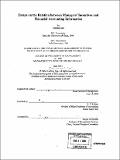| dc.contributor.advisor | S.P. Kothari. | en_US |
| dc.contributor.author | Xue, Yanfeng, 1974- | en_US |
| dc.contributor.other | Sloan School of Management. | en_US |
| dc.date.accessioned | 2005-09-27T17:45:41Z | |
| dc.date.available | 2005-09-27T17:45:41Z | |
| dc.date.copyright | 2004 | en_US |
| dc.date.issued | 2004 | en_US |
| dc.identifier.uri | http://hdl.handle.net/1721.1/28685 | |
| dc.description | Thesis (Ph. D.)--Massachusetts Institute of Technology, Sloan School of Management, 2004. | en_US |
| dc.description | Includes bibliographical references. | en_US |
| dc.description.abstract | (cont.) around thresholds do convey information about a firm's future performance, firms with a higher degree of information asymmetry between the management and investors are more likely to use this signaling mechanism, and the capital market recognizes the information content of the earnings management activities and rationally incorporates it in setting prices. | en_US |
| dc.description.abstract | My thesis consists of two separate essays. Each essay, from different angles, examines the relation between managers' incentives and financial accounting information. The first essay examines how a firm's choice between competing innovation strategies can be affected by the use of accounting information versus stock prices as performance measures in the firm's CEO compensation contract. Firms obtain new technology either through internal R&D or through acquisitions. These two approaches are usually labeled as "make" and "buy" strategies. In this paper, I focus on the two major differences between the "make" and "buy" strategies: risk levels and accounting treatment. I hypothesize that the high risk level and unfavorable accounting treatment associated with "make" strategy relative to "buy" strategy lead risk-averse managers to favor "buy" over "make," should they be compensated heavily using accounting-based performance measures. Stock-based compensation, especially stock options, on the other hand, should encourage managers to innovate more through "make" strategies instead of"buying" them from the outside. Using data from US high tech industries, I find evidence consistent with the above hypotheses. The second essay examines whether managers of information-strained firms signal the firm's future performance by managing earnings to exceed thresholds. Because managers' reporting discretion is bounded by the accounting regulations, managing earnings to exceed the current period's thresholds reduces future earnings, making future earnings thresholds more difficult to attain. As a result, only firms with sufficient future earnings growth can benefit from doing so. My empirical results suggest that the earnings management activities | en_US |
| dc.description.statementofresponsibility | by Yanfeng Xue. | en_US |
| dc.format.extent | 104 leaves | en_US |
| dc.format.extent | 6129717 bytes | |
| dc.format.extent | 6141938 bytes | |
| dc.format.mimetype | application/pdf | |
| dc.format.mimetype | application/pdf | |
| dc.language.iso | en_US | |
| dc.publisher | Massachusetts Institute of Technology | en_US |
| dc.rights | M.I.T. theses are protected by copyright. They may be viewed from this source for any purpose, but reproduction or distribution in any format is prohibited without written permission. See provided URL for inquiries about permission. | en_US |
| dc.rights.uri | http://dspace.mit.edu/handle/1721.1/7582 | |
| dc.subject | Sloan School of Management. | en_US |
| dc.title | Essays on the relation between managers' incentives and financial accounting information | en_US |
| dc.type | Thesis | en_US |
| dc.description.degree | Ph.D. | en_US |
| dc.contributor.department | Sloan School of Management | |
| dc.identifier.oclc | 59006455 | en_US |
